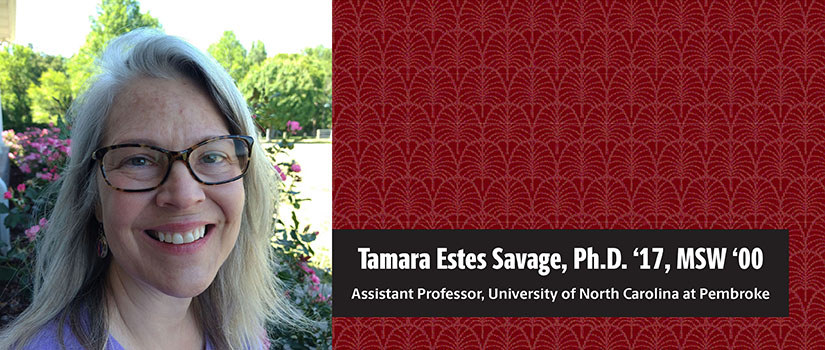While surprising to some, there are connections between social work and biology. A human biology course provides a social work student with basic knowledge to help in assessing client systems and creating intervention plans. One alum initially began her professional career as a biologist. But as a social work professor, she incorporates both of her interests while helping others in ways she could have never imagined as a biologist.
Tamara Estes Savage, Ph.D., ’17, MSW ’00, an assistant professor in the University of North Carolina at Pembroke Department of Social Work, initially began her career in the physical sciences after earning a bachelor’s degree in biology from the University of North Carolina in 1990. While she enjoyed working as a microbiologist for six years, Savage never felt fulfilled and sought a different career.
“I needed more interaction with people, and someone suggested social work,” Savage says. “We moved when my husband took a job near Wilmington (North Carolina). I took a social work class at the University of North Carolina Wilmington, fell in love, and never looked back.”
Savage returned to school and received her Bachelor of Social Work degree from the UNCW in 1998. Two years later, she earned her Master of Social Work degree from the College of Social Work. Back in North Carolina, Savage worked as a children’s social worker at a homeless shelter and worked in hospice while also serving as an adjunct instructor at UNCW. This sparked an interest in teaching social work full-time.
“I loved teaching and even taught some research classes as an undergrad because my research professor was going out of town and asked if I could teach,” Savage says. “I was always the kid in the class who was asked to help someone with their work.”
Returning to South Carolina, Savage began doctoral studies at the College of Social Work in 2011. With previous teaching experience and an enjoyment of sharing knowledge, Savage’s dissertation examined the impact of everyday racism on medication self-management within the African American dialysis population.
Dr. Savage started the doctoral program with social work experience and a passion for social work and social justice. She was very dedicated to the program, driving for hours to our campus each week from home. Her research was very innovative, and the first to explore these important issues.
- Teri Browne, associate dean for faculty and research
Working in academia allows Savage to incorporate social work, community-engaged research and biology. For an undergraduate research course she teaches, Savage collaborates with a freshwater biology professor to address the community’s needs. The students from both the social work and biology courses research the same environmental justice topic from their unique perspectives then share their knowledge with each other. Students come away from the course realizing that biology and social work have plenty in common when it comes to viewing and addressing environmental injustice.
“The biopsychosocial model allows us to look at issues from biological and social work perspectives,” Savage says. “We then get together (as a class) to talk and reflect on the differences and similarities and what it means. I marry the two because even though I’m not as skilled as the biologist (in biology), I can have a conversation and understand their work. My experience in biology allows me the ability to help my social work students demystify ‘science.’”
Away from the classroom, Savage is dedicated to UNCP’s ASPIRE Program, a mentoring program and safe space she started for students experiencing homelessness. She was struck by the large number of first-generation students who came from areas with high poverty rates. After talking with a few social work students about their needs, campus stakeholders helped her establish the ASPIRE program. Savage can relate to these students’ needs since she was also a first-generation undergraduate student who did not have anybody and endured the shame of not having consistent food or permanent lodging.
“We have a place on campus where they can get food and clothing, but a lot of my students don't go there because they’re embarrassed and don’t want anyone to see them,” Savage says. “My space is private, so they can get food, clothing, health supplies or anything they need. It gives them a sense of dignity.
Many of the ASPIRE students don't have anybody and feel alone. I tell them, ‘As long as I'm alive, you'll have somebody in the world.’ I wish I had somebody like me when I was an undergrad, and that was part of the inspiration for starting ASPIRE. It’s nice to have somebody to call on when things get a little tough instead of putting everything on yourself when you're still a teenager.”
UNCP has recognized Savage for her service and teaching. This past academic year, she received the Adolph L. Dial Endowed Award, which recognizes one faculty member who has distinguished themselves in scholarship and creative work. She was also a recipient of the UNCP Outstanding Teaching Award.
“It's wonderful and gratifying to receive these awards in only my fourth-year teaching at UNCP,” Savage says. “I couldn't believe I got both awards at the same time. It means that I have colleagues and students who appreciate me. I just put my head down and do the work that I love.”
For someone who started their career in biology, Savage continues to thrive in teaching social work, conducting research and mentoring students in difficult situations.
“It's fun to share knowledge and be a mentor and create opportunities because so many people have created opportunities for me,” Savage says. “Almost everywhere I have gone, I have been lucky to find mentors that helped me along the way and produced opportunities. I'm now getting to the point where I can do that for students.”
